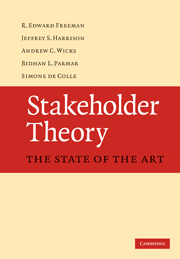Book contents
- Frontmatter
- Contents
- List of figures
- List of tables
- Acknowledgements
- Preface
- Part I The genesis of stakeholder theory
- 1 The problems that stakeholder theory tries to solve
- 2 The development of stakeholder theory: a brief history
- 3 Stakeholder theory, pragmatism, and method
- Part II Stakeholder theory and the traditional disciplines of business
- Part III Stakeholder theory, ethics, and corporate social responsibility
- Part IV Stakeholder theory: some future possibilities
- Bibliography
- Index
2 - The development of stakeholder theory: a brief history
from Part I - The genesis of stakeholder theory
Published online by Cambridge University Press: 05 June 2012
- Frontmatter
- Contents
- List of figures
- List of tables
- Acknowledgements
- Preface
- Part I The genesis of stakeholder theory
- 1 The problems that stakeholder theory tries to solve
- 2 The development of stakeholder theory: a brief history
- 3 Stakeholder theory, pragmatism, and method
- Part II Stakeholder theory and the traditional disciplines of business
- Part III Stakeholder theory, ethics, and corporate social responsibility
- Part IV Stakeholder theory: some future possibilities
- Bibliography
- Index
Summary
The purpose of this chapter is to trace the development of what has come to be known as “stakeholder theory.” We intend to accomplish this in what is perhaps an unusual manner. To begin we go back to Freeman's original book and retell the story, told there, of the origins of the idea of stakeholders. We then suggest a number of additions and revisions that have been made to this history in the literature of the last twenty-five years. We move to what could be called “autobiographical” or “idiosyncratic” accounts of the development of stakeholder theory, mostly from the point of view of one of the authors, Freeman. We do this because we want to illustrate a philosophical point about the general issue of “theory development” and the importance of a role for “the author.” There are many different versions of “stakeholder theory” and we do not wish to try to synthesize all of them into something approximating “the correct version.” A viable social science has an important place for what we might call “the author.” To claim that “the author” has such a role in the development of management theory is neither to promote the self-importance of particular individuals nor to deny the role of intersubjective agreement that is so vital in science. Rather it is to claim that contextual factors and serendipity can be crucial in the process of theory development. Finally, we give an assessment of Freeman's 1984 book.
Information
- Type
- Chapter
- Information
- Stakeholder TheoryThe State of the Art, pp. 30 - 62Publisher: Cambridge University PressPrint publication year: 2010
Accessibility standard: Unknown
Why this information is here
This section outlines the accessibility features of this content - including support for screen readers, full keyboard navigation and high-contrast display options. This may not be relevant for you.Accessibility Information
- 2
- Cited by
